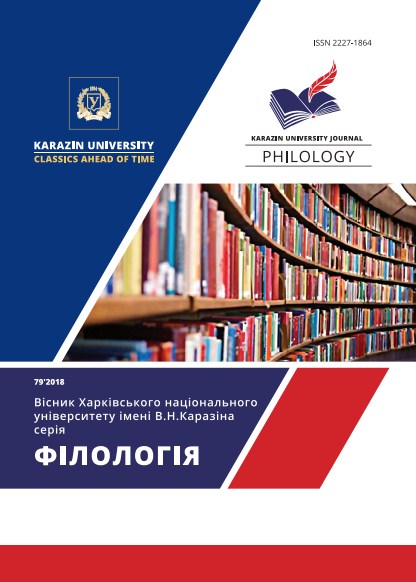Genre Convergence in Contemporary Drama
Abstract
The article is devoted to genre convergence as one of the most widespread varieties of genre transformations in drama at the border of the 20th – 21st centuries. As genre convergence, we understand the process of interaction, convergence, eventually merging of different genres elements in one text. The genre convergence in contemporary drama is the merging of drama, comedy, farce and melodrama elements. The essence of the phenomenon is determined and the difference between the concepts "genre convergence" and "genre diffusion" is established. In contrast to genre diffusion, in the process of which elements of different, polar genres (tragic, comic, farcical) not only interact genre elements that participate in genre convergence, while converging and even merging still keep their autonomy nevertheless.
Unlike genre diffusion, genre elements that are involved in genre convergence, when converging and even merging, still maintain their autonomy. The melodramatic component in the text carries its load and retains its influence on the text and genre nature, comedy and drama perform their own functions.
There you can see convergence of various drama types (epic, lyric), total intertextualisation, intermedialisation of drama piece and also convergence, interaction of different genre elements: comedy, farce, drama, melodrama.
Various manifestations of genre convergence that lead to genre polyphonism, a combination of epic and lyrical drama elements, wide intertextual and intermedial links are analyzed on the material of the play by the сontemporary German playwright Roland Schimmelpfennig "A woman from past times".
Downloads
References
Вартанова Е. Л. К чему ведет конвергенция СМИ? / Елена Леонидовна Вартанова // Информационное общество. – 1999. – Вып. 5. – С. 11–14.
Васильєв Є. «Бережись закоханої!» / Євген Васильєв // Кіно-Театр. – 2007. – № 2. – С. 6–8.
Зырянов О. В. Эволюция жанрового сознания русской лирики: феноменологический аспект / Олег Васильевич Зырянов. – Екатеринбург: Изд-во Уральского ун-та, 2003. – 546 с.
Коптева Г. Г. Эпические интенции в творчестве Николая Заболоцкого: дисс. …канд. филол. наук: 10.01.01 / Галина Геннадьевна Коптева. – Барнаул: Алтайская гос. пед. академия, 2011. – 205 с.
Фрейденберг О. М. Поэтика сюжета и жанра. Подготовка текста, справочно-научный аппарат, предварение, послесловие Н В.Брагинской / Ольга Михайловна Фрейденберг. – М.: Лабиринт 1997. – 448 с.
Чупринин С. Конвергенция в литературе / Сергей Чупринин // Чупринин С. Русская литература сегодня: Жизнь по понятиям / Сергей Чупринин. – М.: Время, 2007. – 768 с.
Шиммельпфенниг Р. Женщина из прошлых времен: пьеса / Роланд Шиммельпфенниг; пер. с нем. А. Рыбиковой / Режим доступу до ресурсу: // http://www.theatre-library.ru/authors/sh/shimmelpfennig
Штейнбук Ф. М. Конвергенція тілесних мікротопосів у сучасній світовій літературі / Феликс Маратович Штейнбук. – К.: Видавничий дім Дмитра Бураго, 2014. – 248 с.
Юферева Е. В. Динамика периферийных жанров в русской поэзии второй половины XIX века. [монографія] / Е. В. Юферева. – К.: Видавничий дім Дмитра Бураго, 2014. – 408 с.
Schmidt D. Mülheim Theatertage. Stücke. 2005 [Електронний ресурс] / Dietmar N. Schmidt – Режим доступу до ресурсу: // http://www.goethe.de/kue/the/nds/nds/aut/smp/ru5049595.htm
Weinzierl U. “Die Welt”, 14.09.2004 [Електронний ресурс] Weinzierl Ulrich / Режим доступу до ресурсу: // /http://www.goethe.de/kue/the/nds/nds/aut/smp/de5049595.htm
References
Vartanova, E. L. (1999) K chemu vedet konvergentsiya SMI? Informatsionnoe obschestvo [What is the convergence of the media doing? Information Society]. No. 5, pp. 11–14.
Vasyliev, Ye. (2007) Berezhys zakokhanoi! Kino-Teatr [Beware of the lover]. No. 2, pp. 6–8.
Zyiryanov, O. V. (2003) Evolyutsiya zhanrovogo soznaniya russkoy liriki: fenomenologicheskiy aspekt [Evolution of the genre consciousness of Russian lyrics]. Ekaterinburg: Izd-vo Uralskogo un-ta. [in Russian]
Kopteva, G.G. (2011) Epicheskie intentsii v tvorchestve Nikolaya Zabolotskogo [Epic intentions in the works of Nikolai Zabolotsky]. [PhD Thesis]. Barnaul: Altayskaya gos. ped. akademiya. [in Russian]
Freydenberg, O. M. (1997) Poetika syuzheta i zhanra. Podgotovka teksta, spravochno-nauchnyiy apparat [Poetics of the plot and genre. Preparation of the text, reference and scientific apparatus]. Moscow : Labirint. [in Russian]
Chuprinin, S. (2007) Konvergentsiya v literature [Convergence in literature]. Moscow : Vremya. [in Russian]
Shimmelpfennig, R. Zhenschina iz proshlyih vremen: pesa [A woman from the past: play]. [Electronic source] Available at: http://www.theatre-library.ru/authors/sh/shimmelpfennig
Shteynbuk, F. M. (2014) Konverhentsiia tilesnykh mikrotoposiv u suchasnii svitovii literaturi [Convergence of bodily microtoposes in modern world literature]. Kyiv : Vydavnychyi dim Dmytra Buraho. [in Ukranian]
Yufereva, E. V. (2014) Dinamika periferiynyih zhanrov v russkoy poezii vtoroy polovinyi XIX veka [Dynamics of peripheral genres in Russian poetry of the second half of the nineteenth century. Monograph]. Kyiv : Vidavnichiy dim Dmitra Burago.[in Russian]
Schmidt, D. Mülheim Theatertage. Stücke. 2005 [Electronic source] Available at: http://www.goethe.de/kue/the/nds/nds/aut/smp/ru5049595.htm
Weinzierl U. “Die Welt” [Electronic source] Available at: http://www.goethe.de/kue/the/nds/nds/aut/smp/de5049595.htm




